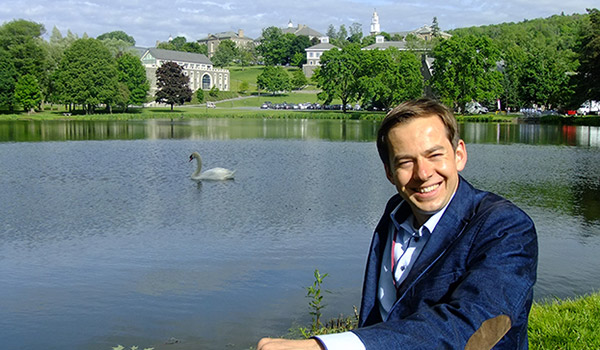
Arnoldas Pranckevicius ’02, European policy adviser
The reaction of the international community to Russia’s aggression against Ukraine has been too slow, too timid, and too little, asserted Arnoldas Pranckevicius ’02. The external policies adviser to European Parliament President Martin Schulz, Pranckevicius shared his perspective in a lecture titled “Ukrainian Crisis: A Key Challenge to the European Security Order” in Persson Auditorium in March.
Noting the quick progression of the crisis, he said, “What was unimaginable only a month ago, today is a reality.” For the past two years, Pranckevicius has been working on a special mediation mission launched by Schulz to help Ukraine meet key conditions to sign a strategic pact with the European Union.
“How do we show Russia that what it has done with Crimea is not only unacceptable, but also that it cannot be repeated elsewhere?” posed Pranckevicius. He then launched into a detailed case study that addressed the origins, causes, and repercussions of the Ukrainian revolution, Crimea’s annexation, and ongoing tensions in Eastern Ukraine.
But, he added, “sometimes people forget to look at the positive side effects.” For example, he said, “Paradoxically, what Putin has unintentionally done is mobilize the people of Ukraine, accelerate its European integration, and forge much closer transatlantic cooperation between the United States and the EU.”
Pranckevicius ultimately stressed that the peaceful resolution of the crisis is not just the responsibility of Russia or the European Union, but of the entire international community.
“His talk connected many of the bits and pieces of the whole incident, providing a context and cohesiveness to the situation,” remarked Anan Hossain ’17.
Pranckevicius also discussed the demands of his advising job. An international relations major at Colgate, he studied at the Paris Institute of Political Studies as one of 70 Rotary World Peace Scholars. After finishing his master’s degree, he fulfilled his dream of working to improve the state of affairs in Lithuania — his native country — by serving as domestic policy adviser to Lithuania’s president. He’s been in his current role — which he landed after winning an open competition to work in the European Parliament — since 2006.
Pranckevicius’s visit was supported by the International Relations Program.
— Hannah O’Malley ’17






